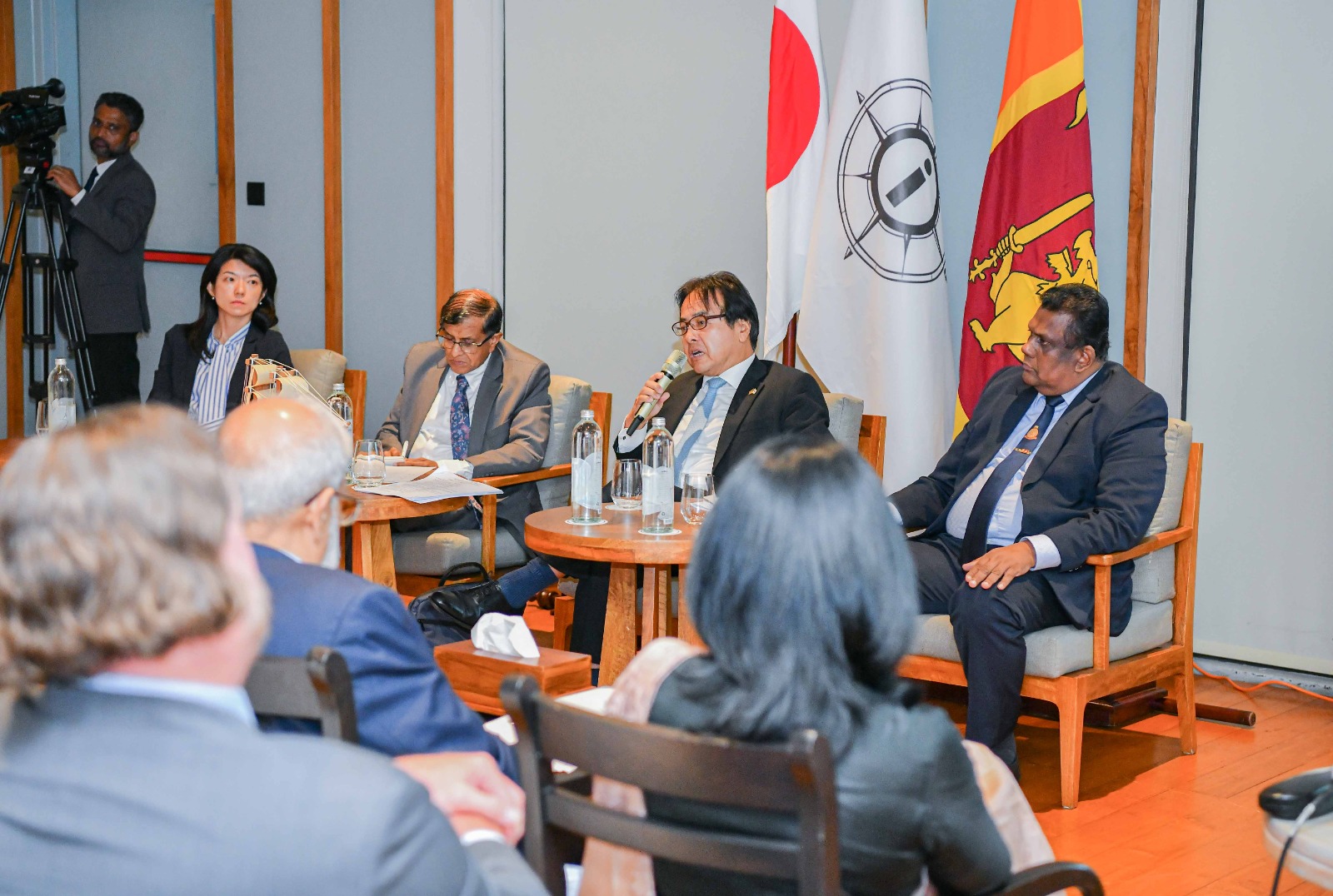Japanese Ambassador Assures Japan’s Support for Sri Lanka’s Economic Development Efforts Commends Anti-Corruption Measures
The Japanese Ambassador to Sri Lanka H.E. MIZUKOSHI Hideaki, expressed Japan’s support for the current program aimed at rebuilding the Sri Lankan economy. Drawing parallels between Japan’s historical journey and Sri Lanka’s current economic challenges, the Ambassador highlighted Japan’s resilience and economic resurgence as a model for Sri Lanka.
These remarks were made during his keynote address at a panel discussion on “Economic Development and Modernization with Lessons from Japan,” chaired by President Ranil Wickremesinghe at the Granbell Hotel in Colombo, organized by the “Geopolitical Cartographer”.
During his keynote speech titled “Japan’s Modernization and Lessons for Sri Lanka’s Economic Recovery and Governance,” the Ambassador shared insights into Japan’s historical challenges, its adaptation to modern changes, and its journey towards rapid development.
The “Geopolitical Cartographer” is an international research foundation established by President Ranil Wickremesinghe, with a primary focus on the Indian Ocean region. Its objective is to conduct research, promote analysis, and study geopolitical, geo-economics, and maritime developments occurring in the Indian Ocean, Pacific Ocean, and the connected landmass.
During his address, the Ambassador reflected on the difficult circumstances Japan encountered globally in the aftermath of World War II. He highlighted the pivotal role played by the late former President J.R. Jayawardene, who represented Sri Lanka at the San Francisco Peace Conference. Despite the international community’s widespread condemnation of Japan at that time, President Jayawardene’s statement paved the way for Japan’s eventual reintegration into the international community. The Ambassador expressed gratitude for this significant contribution, which facilitated Japan’s return to the global stage.
The Ambassador also highlighted Japan’s strategic utilization of this opportunity for reconstruction and economic advancement within its borders. Moreover, he underscored the enduring close relationship between Japan and Sri Lanka, emphasizing the on-going efforts of leaders from both nations to strengthen and enhance bilateral ties.
Additionally, he pointed out that Sri Lanka, currently engaged in economic reforms under an International Monetary Fund program, could draw inspiration from Japan’s experience in overcoming challenges to foster positive transformation within the country. This aligns with Japan’s example of leveraging adversity to drive progress and development.
The Ambassador stressed the significance of nurturing competitive industries akin to those in Japan to propel Sri Lanka’s economic advancement. He underscored the necessity for Sri Lanka to develop comprehensive industrial policies aimed at fostering competitive export sectors while concurrently striving to attain sustainable development objectives.
Ambassador MIZUKOSHI Hideaki commended the proactive measures undertaken by the Sri Lankan government in its on-going anti-corruption initiatives. He expressed Japan’s commitment to steadfastly supporting these efforts, acknowledging the importance of combating corruption for fostering a conducive environment for economic growth and investment.
The Ambassador highlighted Japan’s commitment to aiding Sri Lanka’s anti-corruption endeavours by disclosing that Japan has extended financial aid through the United Nations Development Program to bolster the Commission to Investigate Allegations of Bribery or Corruption in Sri Lanka. Furthermore, he underscored Japan’s readiness to provide support via institutions like the Japan International Cooperation Agency (JICA) for diverse development initiatives in Sri Lanka. Additionally, he expressed hope for future investment opportunities in Japan to facilitate Sri Lanka’s economic growth, emphasizing the potential benefits of fostering bilateral economic ties between the two nations.
Following the keynote address, Ambassador MIZUKOSHI Hideaki of Japan, along with Ms. Azusa Kubota, the Resident Representative of the United Nations Development Program in Sri Lanka, and Senior Professor H. D. Karunaratne, Vice Chancellor of Colombo University, gathered in a panel discussion. The discussion, themed “Economic Development and Modernization with Lessons from Japan,” was moderated by Dr. Ganeshan Wignaraja.
Former Speaker Karu Jayasuriya, Members of Parliament Wajira Abeywardana and Kavinda Jayawardena, Central Bank Governor Dr. Nandalal Weerasinghe, Secretary of the Ministry of Foreign Affairs Aruni Wijewardena, diplomatic corps, academic personnel, representatives of research institutes, distinguished guests, and others were seen presence on the occasion.

